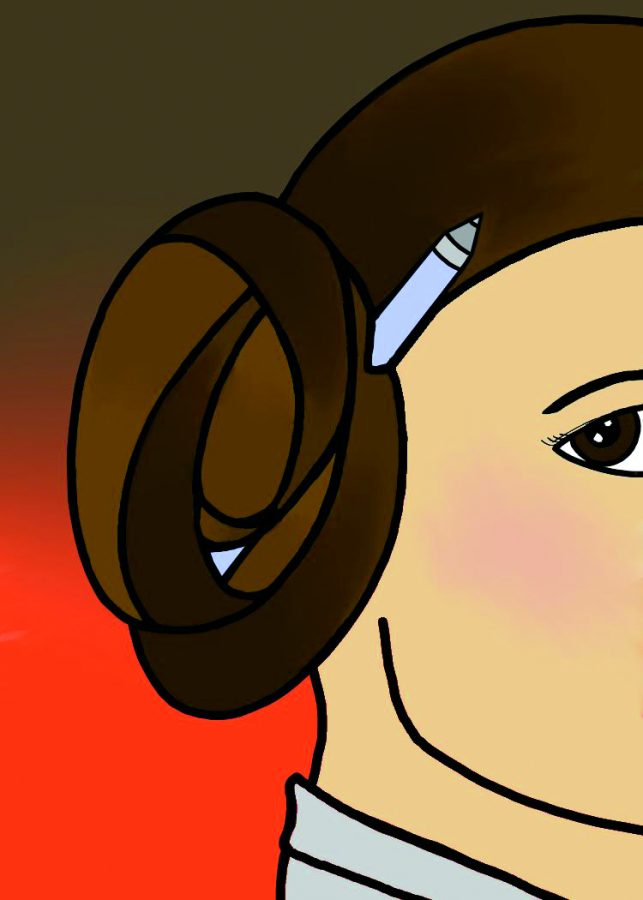In ‘The Princess Diarist,’ Carrie Fisher Reveals Struggles of Early Fame in Characteristic Prose
Carrie Fisher wrote on her experience filming the first Star Wars movie in 1976 in The Princess Diarist, including diary entries from that year.
March 11, 2023
I remember watching Star Wars for the first time: parents pausing to explain things I might not have understood, perhaps on the edge of their seats worrying if I’d like it, though they needn’t have. I was immediately enamored.
I suspect a lot fed my Star Wars obsession. I loved the creatures (I crafted tiny Jabba the Hutts in art class). I loved the terminology (I mimicked entries in Star Wars: The Visual Dictionary in my journal, creating characters and spaceships and planets). But what I most loved was Princess Leia.
I remember the strange grief I felt when Carrie Fisher died two days after Christmas in 2016. Probably a third of my presents that year were Star Wars-themed. On my wall was a Leia poster that proclaimed “Women Belong in the Resistance.”
All of this to say, I cared about Carrie Fisher a great deal as a child. And given that even after her death, we had two more Star Wars movies with her likeness in them, that didn’t go away. Not that I was alone: for generations, Fisher was the center of toys, fan fiction, merchandising, costumes, and lewd magazines – Star Wars and otherwise. Meanwhile, Fisher grappled with the effects of extreme fame: she battled drug and alcohol addictions for years, and publicly struggled with bipolar disorder.
Later in life, Fisher distilled some of these experiences into three memoirs (she also wrote several semi-autobiographical novels). In the final of these memoirs, The Princess Diarist, published just months before her death in 2016, Fisher offers sincere detail into her 1970s life on and off the set of Star Wars. And, for the first time, she published entries from her journal during that period.
1976 Carrie Fisher was just 19 and in love with costar Harrison Ford, as it turns out. She wasn’t expecting (or even wishing) to be big. She was constantly anxious and self-doubting, with body image issues and the beginnings of multiple addictions. She was still reeling from an unstable childhood in the grips of her parents’ complicated fame, and she had almost zero idea of what she was doing. The Princess Diarist reveals all of this. But it also reveals Fisher for the core of who she was: a writer.
Fisher’s journal entries are a mish-mash of poems and prose. She writes about her affair with Ford in metaphorical terms alongside the direct. She describes drug-addled visions in words that are far more advanced than a teen diary should have. And she couples all this with her present-day memories and accounts, recollections of the moments that led to these journal entries. It’s a side to Fisher that, unless you’ve been consuming her previous books, you won’t have seen. But it’s a side that feels essential to understanding who she was.
Fisher used her unique ability to express her life in writing to voice her most unspeakable feelings. This is deeply relatable for not only writers (the majority of whom could not even hope for a voice like Fisher’s), but for almost anyone else who wrote in diaries as a child or an adult and finds themselves reaching for a laptop or a pen with even the slightest of thoughts. Or who imagines themselves one day writing a novel or memoir, only to sit down and have all the words disappear from their thoughts. Fisher has written the words we all hope to write.
For me, it just makes her more of a hero, because she has achieved what I aspire to be able to do: to transpose general thoughts into meaningful writing. She’s always been my hero for her pioneering and advocacy, but here she is someone I want to honor and idolize, and someone I so deeply wish I could have had a conversation with.
In this way, the book also gives a new generation of Carrie Fisher fans who will never see her in comic cons or on the street or even in tabloids a chance to get to know her somewhat personally anyways. It’s not a full representation of Fisher’s life, because no book could ever tell the whole story. But perhaps the best part of it is that it shows a messy, dramatic, naïve-yet-experienced side of Carrie Fisher. She doesn’t take herself seriously much of the time, and yet she is compelled to write. And that is summed up by these two paragraphs from her 1976 diary:
“I would like to not be able to hear myself think. I constantly hear my mind chattering and jabbering away up there all by itself. I wish it would give me a f*cking break. Write, don’t think, write. You’re not thinking properly, Ms. Fisher, I suggest you write.
If anyone reads this when I have passed to the great beyond I shall be posthumously embarrassed. I shall spend my entire afterlife blushing.”
I’m a Leia fanatic. My ball python is named after her; throughout my childhood I’ve had posters and Funko POPs. But through her memoirs, I don’t just see Leia anymore – I see Carrie.























